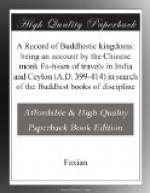At the place mentioned above of the six years’ painful austerities, and at all these other places, men subsequently reared topes and set up images, which all exist at the present day.
Where Buddha, after attaining to perfect wisdom, for seven days contemplated the tree, and experienced the joy of vimukti;(7) where, under the patra tree, he walked backwards and forwards from west to east for seven days; where the devas made a hall appear, composed of the seven precious substances, and presented offerings to him for seven days; where the blind dragon Muchilinda(8) encircled him for seven days; where he sat under the nyagrodha tree, on a square rock, with his face to the east, and Brahma-deva(9) came and made his request to him; where the four deva kings brought to him their alms-bowls;(10) where the 500 merchants(11) presented to him the roasted flour and honey; and where he converted the brothers Kasyapa and their thousand disciples;(12)—at all these places topes were reared.
At the place where Buddha attained to perfect Wisdom, there are three monasteries, in all of which there are monks residing. The families of their people around supply the societies of these monks with an abundant sufficiency of what they require, so that there is no lack or stint.(13) The disciplinary rules are strictly observed by them. The laws regulating their demeanour in sitting, rising, and entering when the others are assembled, are those which have been practised by all the saints since Buddha was in the world down to the present day. The places of the four great topes have been fixed, and handed down without break, since Buddha attained to nirvana. Those four great topes are those at the places where Buddha was born; where he attained to Wisdom; where he (began to) move the wheel of his Law; and where he attained to pari-nirvana.




